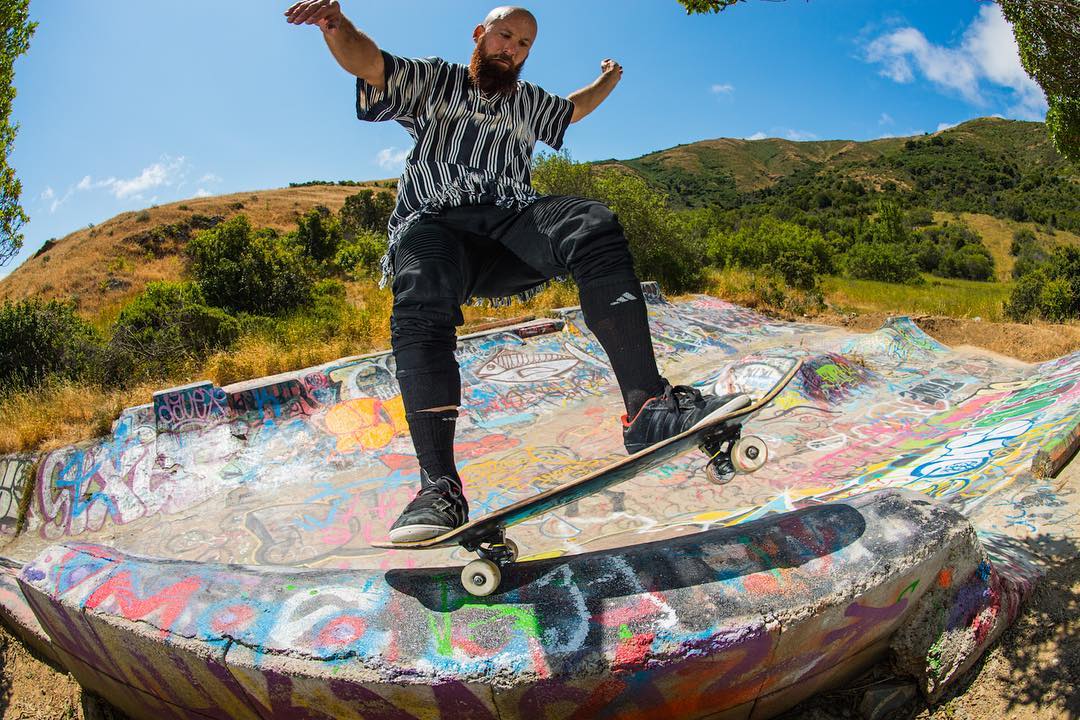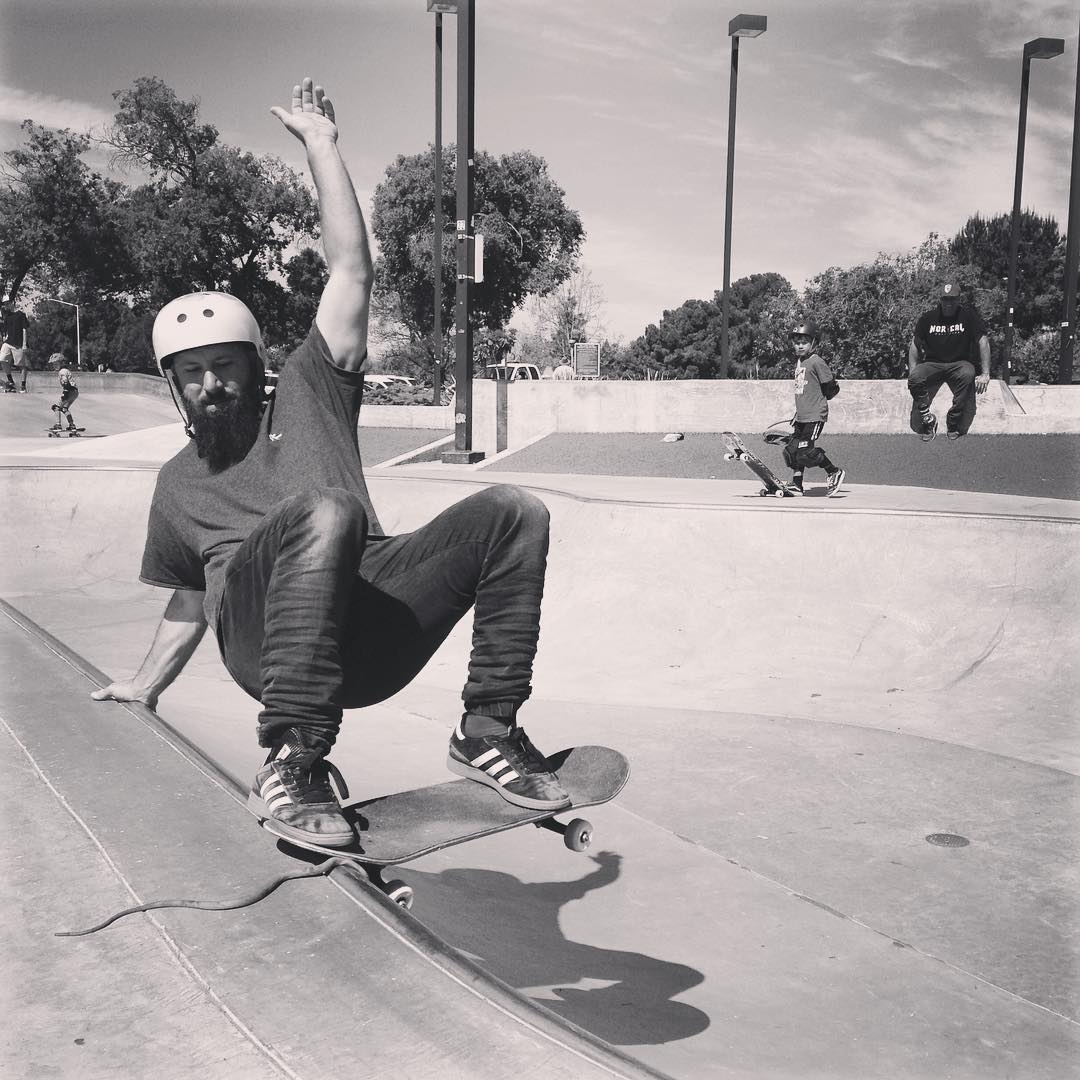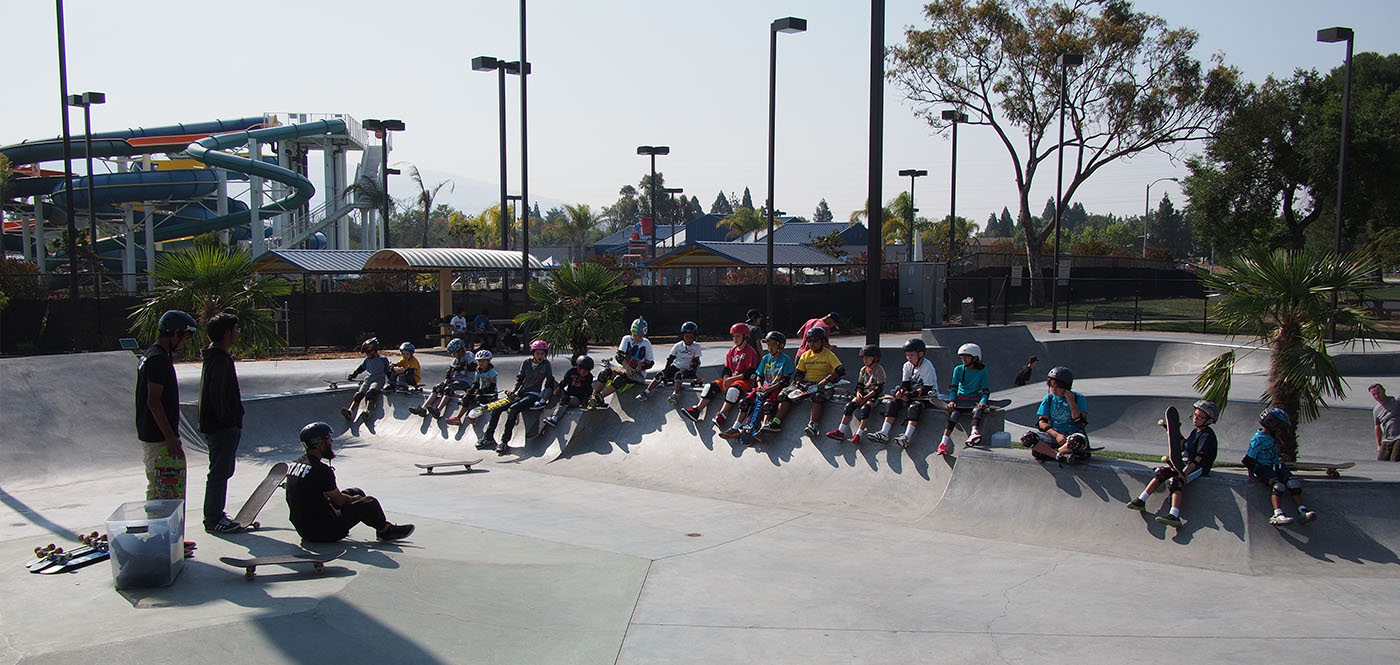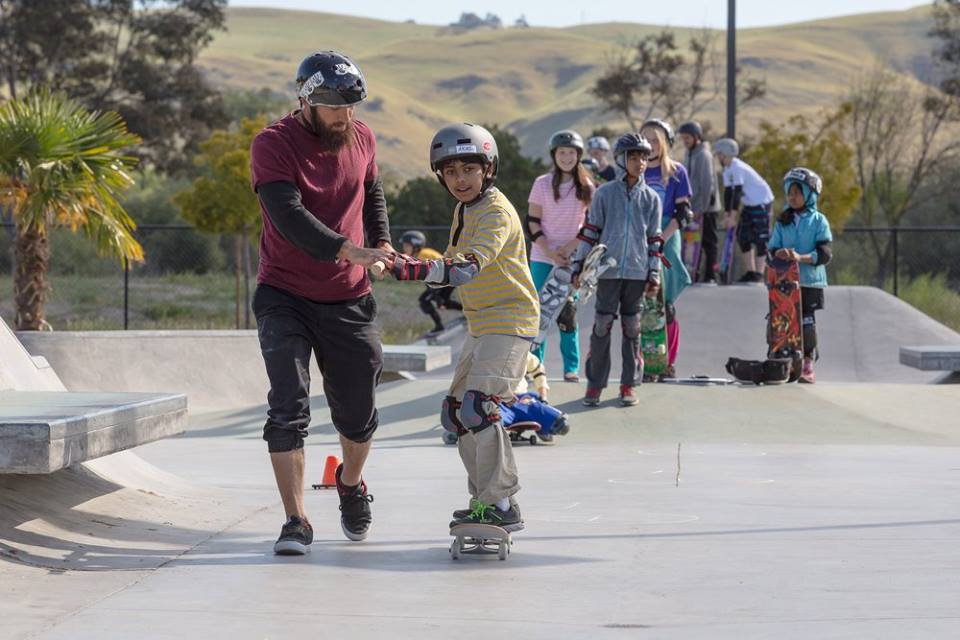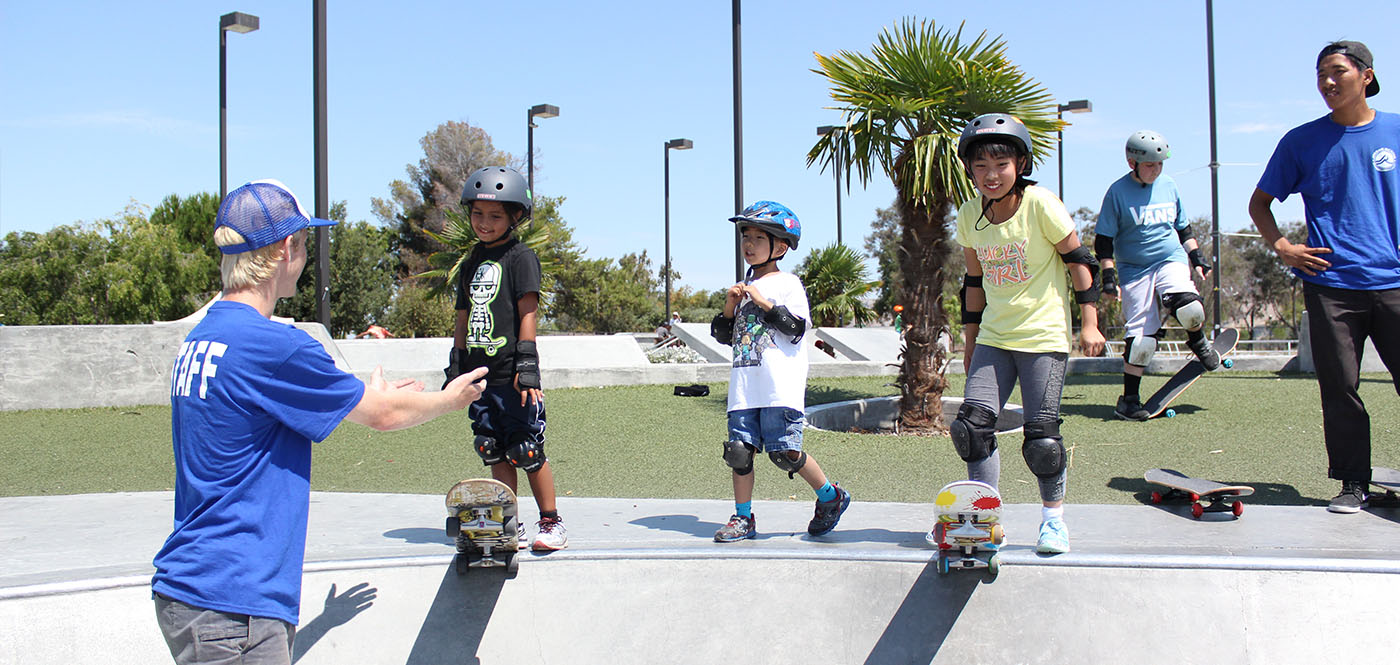Jordan Richter is a Pro Skater from Los Angeles California, in the 90's he embraced Islam. His school, the Jordan Richter Skateboard Academy provides lessons for children and adults along the West Coast. We spoke to him about his life experiences and what it means to be a Muslim Skateboarder..
I got into skateboarding when I was 10 years old, I was coming home from school one day and at the time we were living a few miles away from my school and I was walking home and I saw some skateboarders. And it looked really neat what they were doing, visually it was very appealing what they were doing to me, they’re flying on this wooden plank. And they were just in their front yard riding on a quarter pipe which is basically a ramp that they built in their front yard. That was my first contact with skateboarding and then I would stop at that same house everyday on my way back from school for months on end until I established a relationship with the guys there and that evolved into going on little skateboard excursions to like ditches and local skate parks and spots. I kind of had a mentor in my early stages his name was George Medlock; he would take me around to skate different parks in the area around San Diego.
What does skating mean to you? How does your faith play into your philosophy of skating?
When you’re younger you don’t have any cares in the world, you don’t have a lot of obstacles holding you back and if you can you just skateboard all day and have fun. When I became a Muslim my outlook on life changed and my priorities became a little different, I still have fun skateboarding and I still enjoy it, I love skateboarding, but I think that there’s a different element to it now. Before I would escape the problems of the world and skateboard, and now I kind of need to have my personal life in line for me to really feel good while I skateboard. It’s not as much of an escape as it was when I was younger. In a way, skateboarding for me is a way I can sort of use the way I’m feeling on my skateboard and the confidence I have on it is kind of a thermometer to how I rate myself in my spiritual life, so if I’m very confident and I don’t have much fear, fears of getting hurt and my mind isn’t chattering a bunch of negative thoughts, then chances are my life is in a good state, my prayers are being done on time, I’m not looking at things I shouldn’t look at and not violating anyone’s rights. I really feel strongest when I’m on my skateboard when I have my spirituality intact you know.
Almost ironically, being a Muslim and a skater have their own separate prejudices, has this ever affected you?
Well, I grew up a Jew, I experienced prejudices then. I became a skateboarder and I experienced prejudices then! And now as a Muslim I’m very aware of what prejudices are but I think you don’t internalise them too much anymore, but I don’t really think about them much anymore. If you take skateboarding for example, there’s a stereotype that surrounds skateboarders as being druggies or being rebellious. You picture young kids that just want to screw with you and make fun of you and all these negative things when you think of a skateboarder. But in reality if you look at the real professional skateboarders who have really mastered their craft, they, for the most part, even though there are those elements, the real successful ones have nothing to do with that stereotype. In fact, those two worlds cant really live together if you’re trying to be a professional athlete. Obviously, thats the same for Islam all the stereotypes that you hear about, they’re ridiculous to us because we know in order to really be a true Muslim, who really in a sense, has mastered some aspects of himself or some aspects of their spirituality.
I think as Muslims we put our scholars on an unreasonable pedestal because we think, that’s for them and that’s unreachable for us and only they are the masters and then we have this kind of idolisation that happens which is really unhealthy, not to digress but those are two elements which are definitely misunderstood. I mean for me I’ve seen it, I’ve experienced it!
How do you reconcile the two within your own life when some may see them as two different worlds?
This is a major issue I have and I’ll say this openly to the whole community without any worries at all. The thing I have a major issue with is, we are out of touch with the reality of the world, actually we are completely in our own world. We’re not too astute with the real world and what’s going on. And I know that’s pretty general to say, but I say that because skateboarding is a multibillion dollar industry, Nike, Adidas, Puma, we’re talking about tennis shoes, they all have a stake in the industry of skateboarding. ESPN, MTV, it’s a completely relevant industry. In fact, it's more relevant than basketball and football in some parts of the world.
So when those same brothers give you that look, understand that what they're doing is revealing their own inability to look outside anything beyond basketball. For them, basketball in the gym is all they know 90% of the Muslim youth. Oh what do you do? Basketball and soccer and go to the gym? Whoop de doo, Wow. Why is that? Because we don’t know ourselves. We don’t even want to attempt to know ourselves. So even if we have a genuine interest in skateboarding, very few people are bold enough to try it, because we don’t want to be laughed at, we don’t want to be marginalised. And sure enough, when we bring the skateboard to the masjid, we get all these crooked looks. And this is a problem, and this is really a kind of trivial thing in some cases but in its not. When you think of a young child, a 16 or 17-year-old who’s going through a major identity crisis major shifts in his own personal life and identity, maybe he loves skateboarding because it gives him something and maybe he wants to just ride the skateboard to the masjid because that’s how he wants to go to the masjid because that’s what he enjoys doing. And he loves Islām and he loves Allāh. I think it’s a ridiculous question, because who’s to say skateboarding isn’t the same as any other activity. Who’s to say skateboarding isn’t the same as riding a horse? And who’s to say skateboarding is any better than riding a horse, or any more acceptable or not?
I do understand the context of you asking the question, but I do think it’s ridiculous that it has to be asked. Because it’s like halāl meat, we’re still talking about how halāl meat works, the Jews do not have those issues, they don’t have these forums where do I get a halāl hamburger from. So unfortunately, we’re very behind the times and we’re very out of the loop and there are some good aspects of being behind the times and that’s when we’re in good contact with the Sunnāh of the Prophet, that’s a good place to be. If the kid wants to ride the skateboard, let him ride the stupid skateboard, what’s the big deal?
Does it have any effects on you in terms of socialising or fasting?
Not really, no. I mean of course it has its challenges to it, but it’s just like anything If you’re active. Honestly, I try to turn things down a little bit during Ramadhān I think naturally I can only do so much. But socially it doesn’t affect me, you know telling people I fast, they appreciate that and it inspires some of them, you know, maybe I’m not going to fast the entire month of Ramadhān but maybe I’m going to have some dietary changes. Especially in my circles of friends it's looked at as wow, this is a great health option.
We're not the only ones, yes we’re unique in our religious practice because it's the Prophet’s way and Mā shā' Allāh it’s the best way, but in the grand scheme of things, there are people that are more extreme than that. There are people that do intermittent fasting there are people that will go through 40 days of drinking maple syrup and water and lemon. There are people from other faiths that don’t happen to share the same faith as us but they're raw vegans, for us yes great we fast but then we shove our face with a whole large pizza, fries a couple milkshakes it’s like we never fasted, and I’m sorry I’m very critical of this stuff because we’re not as spiritual and great as we think we are, we should be and there are exceptions to the rule, I’m speaking about myself, we’re not really fasting the way we’re supposed to be fasting. We’re cramming our stomach with a bunch of food prior to fajr and then after maghrib hits, we cram ourselves with three times the amount of food as Fajr time! [laughs] but alhamdulillāh, we got a lot of work to do.
You have an academy for kids, teaching them how to skate, how did the idea for it come about?
It all started when I was traveling 20-23 years ago roughly, probably up to 25 years ago, I would travel to different skateboard camps where they would have camp and then different sessions where we would help the kids. I’ve been working instruction, informally for 25 years. When I became serious about it and started charging to teach was probably about 15-16 years ago and so 4 years ago we started to do partnerships with cities. So I would become a vendor with the city and I would contract with the city to provide quality skateboarding programs for their skate park under their parks and recreation services department. Like many parks and rec communities here in the US many of them provide for the community, it’s like football basketball, tennis, soccer, ballet and so on. So, for those park and rec communities that have a skate park on site, we now want to become the leading resource in providing programming for those skate parks. Right now we’re in the process of building a nationwide network of instructors that are positioned or attached to certain public skate parks where parents want to find a skateboard instructor near them they can find it through our website and they can book a skateboard instructor and basically get lessons for their child.
Your son skates as well, have you seen the academy effect his growth as well as the growth of the other kids?
We’ve had, 1200 kids go through our program so far, roughly and that’s in the past three years or so. Out of those 1200 probably we have had a least half of those kids who have never skateboarded before. So we’re bringing kids that have never had any contact with skateboarding before, they may have taken some computer classes or soccer classes through their city and they want to try out skateboarding to see if it’s for them or not.
And the response has been amazing because, we have autistic children that come through our program, kids with special needs, who for them that’s the only thing that they love to do, to skateboard because any other sport they’re challenged by their peer group because they’re under performers and they can’t really throw a ball the way others can but they can find their voice and place in skateboarding. And essentially they find a craft and sport, an activity they can put their heart into, so we’ve seen a great response from every level, from the young kids and the older people that have engaged. Not just our program but just who have been in contact with skateboarding in general and we just happen to provide a place for them to learn and it's amazing.
You see a child who has never skateboarded before and you see them a year or two later and they’re amazing and they have a big smile on their face and they enter contests and they get sponsorships. I taught one of the X games Lyndsey Adams Hawkins she was one of my early students of 17-16 years ago and she won X Games gold medal a few years back. It great and amazing seeing the growth and to know you’re a part of that.
The majority of our students are 6-12 year-olds. but, we’ve had 50 year olds we’ve taught, just depends. I have a 54 year-old student right now. Never too late.
More and more people are becoming Muslim, most of them have no sort of prior cultural connection to Islam, what advice would you have for the Muslims who might be from culturally Islamic backgrounds that see these converts come into the religion?
I think it’s a special time for any community when a new Muslim comes in, because it’s really a kind of test of our own patience really. Because a lot of new Muslims come with a lot baggage, that’s just the reality. They came into Islam because everything else in their life wasn’t working. There’s these really rare cases when you have these balanced, educated Hamza Yusuf’s and Hakim Murad’s kind of people who come into Islām. But the majority are coming in broken, the majority are coming in with some major challenges. So I think the community members should look historically at the Prophet’s way of dealing. And we just need to use that model. First teach them īmān, let them understand who Allāh is. And once they understand who Allāh is and they begin to love Allāh, they’re going to love the Prophet. And then by default they’ll make salāt and by default they’ll fast, by default they’ll make Hajj and they’ll start incorporating all the aspects of Dīn.
But I think that there’s this gross impatience that we have because we as Muslims who have been Muslims for a longer time we know how special Islām is and we have this kind of obsessive compulsive way of wanting to share our Islām with a newcomer. And so we start dropping on them all these tasks that are really irrelevant for a newcomer. You come into Islām, you may have a drug problem, you may have a girlfriend you may even be gay, I don’t know what you are but I’m not going to meddle in your personal stuff, I’m going to let you be you. It’s my job as a brother to show you the love and compassion and mercy and give you the tools that you need and be there to support you in your journey, not tell you this is harām that is harām, brother you shouldn’t have a girlfriend, brother you shouldn't eat McDonalds, the guy has been Muslim for two weeks, take it easy, back off.
And this is an issue, it happened recently. One brother came into Islām in our community, he was like I love Islām, this is the best thing that ever happened to me, I saw him in the coffee shop every day studying. He was already on his way, he didn’t need any extra information, but what you had, you had these two brothers in the masjid who themselves, one of them came back to Islām who never practiced Islām, came from an Afghan background and now he was ‘super’ Muslim, wants to go around and correct everyone. And then you had a convert who just came into Islam who wants to enforce sharīa on him too. So now this brother he calls me and says look, I don’t even feel comfortable anymore coming to the masjid these brothers are talking to me telling me this is harām that is harām don’t do this don’t do that, I can’t take it. I haven’t seen the brother since; it’s been like 2 months. We don’t even get affected by this, and actually, we have the audacity to blame Allāh on this. We say it’s up to Allāh to guide him…NO you stupid idiot! It was up to you not to screw it up.
I’m very particular in this and this is a catastrophe. That’s my advice and I know you’re going to transcribe this so you’re going to leave out certain stuff [laughs] but you know that’s the thing you know? One thing stands out, one message to them one message to the brothers in the masjid that witness a conversion happen? My message is, this person is a tree, a tree can take a year or two to blossom, or however long it takes, [not a] a building you can erect in a couple months. I think we need to back off, and be there as support and be there as a listener, listen to a person’s problems be there to serve the person and listen to them and care for them, and be a friend to them! If a person is not qualified to teach Islām to someone, then they should direct him to a book or direct him to a scholar or direct him to a resource where he can get the proper guidance a lot of the time what happens to the convert, happens with these kids who become, I hate to use the term because I never believed it before, but kids really do become radicalised because they get in touch with some extremist mentality, some weirdo who is on the wrong website who finds a new Muslim, it's serious, it’s really a big deal. Connecting them with the right people is crucial.
New Muslims often face this pressure from the Muslims around them to learn and they might feel overwhelmed, did you ever experience this? What would you suggest for new Muslims who feel the pressures of becoming a Muslim?
Don’t feel afraid to say back off. This is my life, this is my family this is me and my relationship with Allāh. I mean, who the hell are you? Let me see your life, let me see your skeletons in the closet. I’m saying this facetiously; we have to protect ourselves as converts.
The words Sherman Jackson told me: Islām is a marathon its not a race. Converts need to know Islām is a slow process.
Do you still see skating how you saw it during the blind team days?
Yes, and no, I go through phases nowadays. I have a love-hate relationship with skateboarding and it all centers around how I’m feeling at the time, both spiritually and health wise. So if I’m feeling really good and I’m skating a lot I love skateboarding so much, because I feel I have a certain standard for myself and if I’m not living up to that it’s hard for me to just enjoy skateboarding without doing it the way I know how to. I really have to do a lot of maintenance with my physical health and my spiritual health. I have to be on top of myself to get the most out of skateboarding when I was younger obviously I didn’t have to worry about those same issues. It's just different now, I enjoy it totally I just have to be more on top of myself now to get the same feelings and benefits the way I used to.


